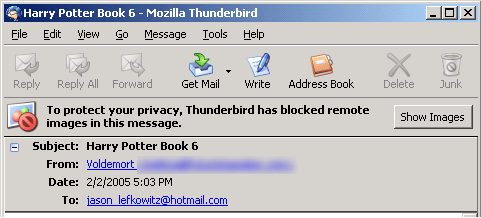The End of Sports Games
Posted on January 25, 2005
I don’t think it’s an exaggeration to say that we’re witnessing the end of an era for a whole genre of video games: the sports game. And the reason has nothing to do with gaming and everything to do with some less-than-inspiring business deals.
Ever since consoles got sophisticated enough in the early ’90s to offer a realistic-seeming sports game, games have competed in the marketplace based on their “realism”. One critical element of creating this sense of realism was obtaining the right licenses — if you were making a football game, for example, you wanted the NFL license you could use actual NFL team names, and the NFL Players’ Association (the players’ union) license so that you could use the names of real players. A football game where the customer can play the Eagles or the Patriots has a big leg up over one where you have to play the Philadelphia Founders or the like.
Up to this year, all the groups (leagues and associations) that controlled these licenses offered them on a non-exclusive basis to anyone who paid the license fee. This worked well for everybody: the leagues & associations got a fat check from every company making sports games, and customers got a range of licensed games to choose from.
One company that made out particularly well under this arrangement was Electronic Arts, whose EA Sports line of games is considered by many the gold standard of sports gaming. Their “Madden” football games have become so popular they are a kind of subculture unto themselves; there are actually professional Madden players who study the game like it was the Talmud.
Last year, though, EA faced its first real competition in this market in more than a decade, from longtime game publisher Sega. Sega has its own sports game team, a development studio called Visual Concepts; they put out some truly amazing games for Sega’s last console, the Dreamcast (including NFL2K, NBA2K, and World Series Baseball 2K2 — I actually played an entire season in that baseball game, 162 games, which is a testament to the sheer quality of the design).
Anyway, when the Dreamcast died Sega repositioned itself as a maker of games for other companies’ systems, which meant Visual Concepts started pumping out titles for the PlayStation 2 and XBox. In the last couple of years, they have really hit their stride: Sega landed a partnership with ESPN that let them brand their games as “ESPN NFL 2K4” and so on, and they revamped the presentation to look and feel like an ESPN broadcast. By 2004 Visual Concepts was creating products that Sega felt could take on the EA juggernaut.
There was only one problem, though: nobody was buying them.
Mostly that was because it was hard to see anybody standing behind EA, the 800-pound gorilla. Football gamers just picked up the latest Madden on reflex, not even looking at other alternatives. Sega needed to do something to shake up the market.
So last year, they did something dramatic — they cut the price on all their sports games to $20. That’s $20 for a full-featured game, comparable in every way to EA’s offerings, which typically sell for $50. It was a gamble that the lower price would break them out of Madden’s shadow.
It worked — Sega’s games got a lot of critical attention last year, and a lot of sales. Many reviews of Sega’s football offering cited it as better than Madden on the merits, never mind the $30 difference in price.
So now EA had a problem — the Madden money train was under attack. What to do? They could have lowered the price of Madden next year, or competed on features to justify the higher price. But instead, they chose a different path.
In December, EA announced a new five-year deal with the NFL and the NFL Players Association that would give them, for the first time, exclusive rights to use those licenses — leaving Sega out in the cold. Next year Sega could make a better football game, and they could charge less for it, but they couldn’t use NFL teams or players in it — kneecapping Sega’s ability to compete. For this monopoly, EA is estimated to have paid the NFL between $300 and $500 million.
The other shoe dropped this month, when EA announced a second deal — this time with Sega’s (former) partner, ESPN. The new deal gave EA exclusive rights to ESPN’s brand and personalities for a stunning fifteen years. (To understand how long that is in the software business, reflect that fifteen years ago, in 1990, the state-of-the-art home football game was Tecmo Bowl on the Nintendo.) This was another hard hit to Sega’s products — now they would have to jettison not just the NFL licenses, but the ESPN ones too.
And then yesterday the Major League Baseball Players’ Association, not to be outdone, signed its own seven-year exclusivity deal with another publisher, Take Two Interactive — making Take Two the de facto monopoly-holder on baseball games.
Sega, battered by these developments, has thrown in the towel. They have sold Visual Concepts to Take Two for a fire-sale price of $24 million — less than a tenth of what EA paid the NFL just to secure the league license.
So let’s recap what all this means for the customer:
- Fewer choices: As more major sports leagues secure these exclusivity deals, you will rapidly see one game emerge in each sport as the “approved” product; all others will fall away or suffer dramatic falloffs in sales
- Lower quality: Having an open market led to Sega and EA competing, which ended up driving prices down and product quality up. Handing out monopolies will push things in the opposite direction — expect to see the same game re-sold over many years, with just the stats updated and some minor tweaks
I’m with Greg Costikyan on this one; the only people who win from this development are EA (who can use their buckets of cash to hamstring any potential competitors with these licenses), and the licensors themselves, who capture a windfall up front. Of course, as the quality of the games falls off (as it will, as lack of competition leads to laziness), the total value of the market segment will shrink, but that happens over time, so they may not even notice that they have killed the golden goose until it’s too late.
Which would suck. But why, you ask, have I devoted so many words to a subject that is, after all, just games? Because it seems symbolic of so much of what is wrong with America today. We have this cultural myth that, if someone builds a better mousetrap, the world will beat a path to her door. More and more, though, we seem content to let incumbents lock down their markets, shutting out the better mousetrap before it ever poses a threat. You might be able to make a buck with your mousetrap; but if you ever pose a real challenge, they will swoop in and smash you before you even hear them coming. All of which is how economies, and societies, wither, stagnate and die — an outcome which we all seem to find less frightening than the idea that a few entrenched companies might have to work for their supper.
And meanwhile, all the people like me in the world who just like to fire up a good baseball game once in a while and take a drubbing as the Cincinnati Reds lose out. Thanks for nothing, guys.
UPDATE: Penny Arcade has weighed in on the subject today:
[W]e sought to secure “rights in perpetuity to any and all humorous comic interpretations and/or situations arising or inferred from the electronic entertainment industry and/or the products thereof.” The fact of the matter is that with strips like Ctrl-Alt-Del, VG Cats, PvP, and that fucker Greg Dean (congratulations on the engagement!) nipping at our heels – and the black day of the single, hydra-headed Ultrapublisher ever hastening – the air’s getting a little thin.
You might be wondering what recourse is available to you, the disenfranchised web auteur. Honestly? Dig a hole and die in it. I have crafted these bleak circumstances, and I have set them upon you like dogs. Your exertions will only make you more delicious to them. They will find you cast in blue light, huddled in the subdirectory where you shiver with your .gifs, and they will end you.
Funny stuff!


